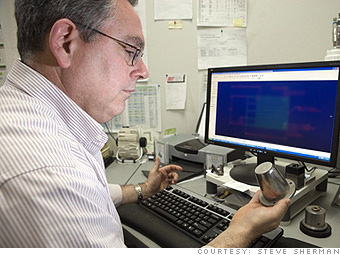 Sherman picked up biology on the job.
Top 100 rank: 10
Sector: Scientific Research What they do: Design and develop medical devices, treatments, and procedures, from artificial hearts to drug-delivery systems. Breathtaking technological advances are intersecting with the medical needs of an aging population, creating what the U.S. government projects will become "the fastest-growing occupation in the economy." What's to like: The mix of disciplines, says Steve Sherman, 54, a biomedical engineer for Maine Manufacturing in Sanford, Maine, which produces lab supplies and components for medical equipment. "Some days I'll work only in biology, other days in engineering, and sometimes combine the two." What's not to like: Though it's growing fast, the field remains small, with only 20,000 jobs. Turning a technological advance into a marketable product can be difficult. Requirements: An undergraduate mechanical, electrical, or chemical engineering degree, coupled with some bio background, is often enough. (Or you can pick up the biology on the job, as Sherman did.) But as more schools award biomedical engineering degrees -- the number of college programs has doubled in the past decade -- that credential will become a must. Do Biomedical Engineers have great jobs, or what?
| ||||||||||||||||||||||||||||
|
Biomedical Engineer stats
|
||||||||||||||||||||||||||||
| Job title | Best Jobs rank |
|---|---|
| Anesthesiologist | 68 |
| General Surgeon | 75 |
| Emergency Room Physician | 25 |
| Job title | Best Jobs rank |
|---|---|
| Biomedical Engineer | 10 |
| Telecommunications Network Engineer | 21 |
| Physician Assistant | 2 |
| Job title | Best Jobs rank |
|---|---|
| Biomedical Engineer | 10 |
| Transportation Engineer | 51 |
| Statistician | 64 |